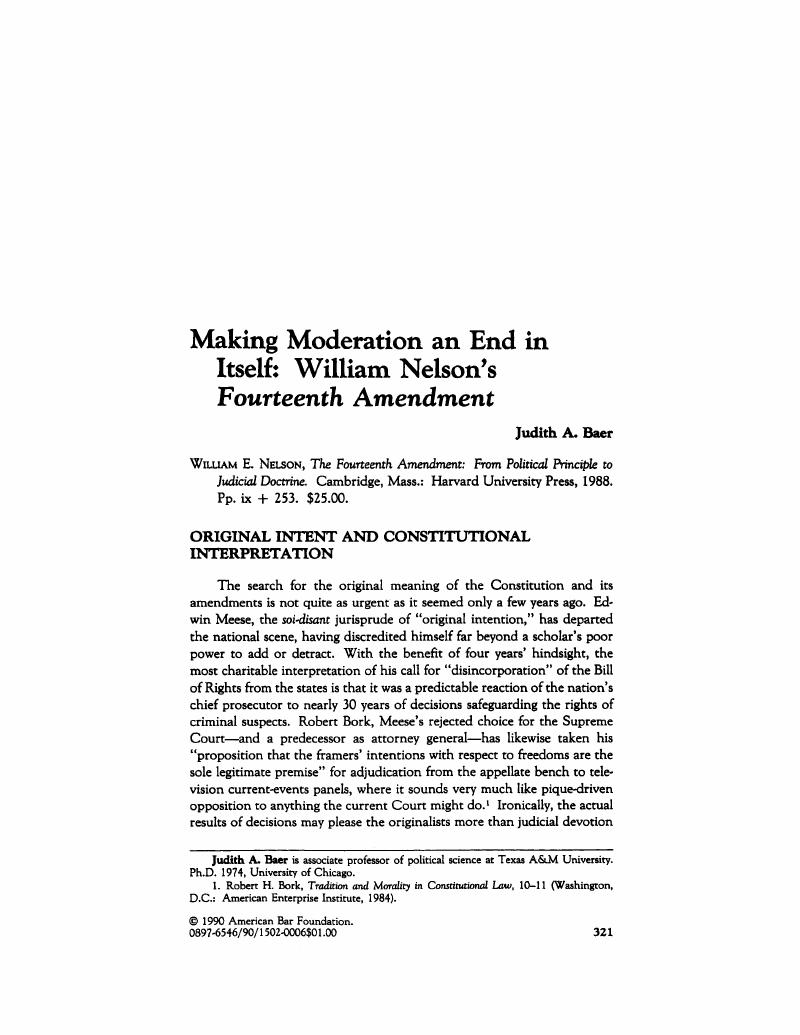No CrossRef data available.
Published online by Cambridge University Press: 27 December 2018

1 Robert H. Bork, Tradition and Morality in Constitutional Law, 10–11 (Washington, D.C.: American Enterprise Institute, 1984).Google Scholar
2 Abrams v. United States, 250 U.S. 616, 630 (Holmes, J., dissenting).Google Scholar
3 Michael Perry, The Constitution, the Courts, and Human Rights 75 (New Haven, Conn.: Yale University Press, 1982) (“Perry, Constitution”).Google Scholar
4 School District of Abington v. Schempp, 376 U.S. 203, 241 (1963).Google Scholar
5 Perry, Constitution 63; Raoul Berger, Government by Judiciary (Cambridge: Harvard University Press, 1977) (“Berger, Government”).Google Scholar
6 Kelly, Alfred, “Clio and the Court: An Illicit Love Affair,” 1965 Sup. Ct. Rev., 119, 122.Google Scholar
7 Berger, Government; Chester J. Antieau, The Original Understanding of the Fourteenth Amendment (Tucson, Ariz.: Mid-America Press, 1981).Google Scholar
8 Michael Kent Curtis, No State Shall Abridge: The Fourteenth Amendment and the Bill of Rights (Durham, N.C.: Duke University Press, 1986) (“Curtis, No State shall Abridge”); Judith A. Baer, Equality under the Constitution: Reclaiming the Fourteenth Amendment (Ithaca, N.Y.: Cornell University Press, 1983) (“Baer, Equality”).Google Scholar
9 See, e.g., McDowell, Curbing the Courts: The Constitution and the Limits of Judicial Power (Baton Rouge: Louisiana State University Press, 1988), and id, Book Review, Pol. Sci. Q., Fall 1984, at 566 (reviewing J. Baer, Equality under the Constitution); Wolfe, The Rise of Modern Judicial Review: From Constitutional Interpretation to Judge-made Law (New York: Basic Books, 1986).Google Scholar
10 Disquisition on Government, in Richard K. Cralle, ed., The Works of John C. Calhoun 52 (Columbia, S.C.: A. S. Johnston, 1851).Google Scholar
11 For my recent work, see “The Fruitless Search for Original Intent,” in Michael W. McCann & Gerald L. Houseman, eds., Judging the Constitution: Critical Essays on Judicial Lawmaking 49, 54–57 (New York: Scott, Foresman, & Co., 1989); Interpreting in Ignorance: The Ratification of the Fourteenth Amendment (paper delivered at the 1989 annual meeting of the Law & Society Association, Madison, Wisconsin, June 8–12).Google Scholar
12 332 US. 46, 105–07.Google Scholar
13 “Does the Fourteenth Amendment Incorporate the Bill of Rights? The Original Understanding,” 2 Stan. L. Rev. 5 (1939).Google Scholar
14 Crosskey, William W., “Charles Fairman, ‘Legislative History,’ and the Constitutional Limitations on State Authority,” 22 U. Chi. L. Rev. 1 (1954); Kelly, 1965 Sup. Ct. Rev. at 119.CrossRefGoogle Scholar
15 Curtis, , No State Shall Abridge 91 (emphasis in original).Google Scholar
16 Fairman, , 2 Stan L. Rev. at 5.Google Scholar
17 Berger, , Government, 145, 244, ch. 13.Google Scholar
18 See, e.g., Martin Duberman, The Uncompleted Past (New York: Random House, 1969); and id., The Antislavery Vanguard New Essays on the Abolitionists (Princeton, N.J.: Princeton University Press, 1965); Fawn Brodie, Thaddeus Stevens: scourge of the South (New York: W. W. Norton, 1959); David Herbert Donald, Charles Sumner and the Coming of the Civil War (New York: Alfred A. Knopf, 1960); and id., Charles Sumner and the Rights of Man (New York: Alfred A. Knopf, 1970).Google Scholar
19 See, e.g., Baer, Equality ch. 4.Google Scholar
20 Id.Google Scholar
21 See, e.g., The exchange between Senators Henry Wilson of Massachusetts and Edgar Cowan of Pennsylvania, Cong. Globe, 39th Cong., 1st Sess., S. 339–44 (Jan. 22, 1866).Google Scholar
22 Hyman, A More Perfect Union: The Impact of the Civil War and Reconstruction on the Constitution (New York: Alfred A. Knopf, 1973).Google Scholar
23 83 U.S. 394 (1873).Google Scholar
24 S. Exec. Doc. No. 2, 39th Cong., 1st Sess. (1865).Google Scholar
25 Cong. Globe, 39th Cong., 2d Sess. S. 40 (Dec. 10, 1866). Nelson's references to the Globe cite only the Congress and session numbers, page, and year—not the month and day. This omission is curious, given the Harvard University Press's reputation for requiring meticulous documentation. The lack of dates also makes any collective deliberation difficult to follow.Google Scholar
26 Cong. Globe, 39th Cong., 1st Sess. 2538 (May 10, 1866).Google Scholar
27 Id. at 2539–43, 2545, 3149.Google Scholar
28 Id. at 1063–64; Nelson at 139.Google Scholar
29 See Baer, Equality 90–92.Google Scholar
30 Cong. Globe, 39th Cong. 1st Sess. 505 (Jan. 30, 1866).Google Scholar
31 347 US. 483, 495 (1954).Google Scholar
32 Id. at 489.Google Scholar
33 Florida, McLaughlin V., 379 U.S. 484 (1964); Loving v. Virginia, 388 U.S. 1 (1967).Google Scholar
34 Baer, Equality ch 5; and id., “Sexual Equality and the Burger Court,”W. Pol. Q., Dec. 1978, at 470–91.CrossRefGoogle Scholar
35 Reed v. Reed, 404 U.S. 71 (1971); Craig v. Boren, 429 US. 190 (1976).Google Scholar
36 Berger, , Government 245 (cited in note 5).Google Scholar
37 Baer, , Equality 253.Google Scholar
38 Curtis, , No State Shall Abridge 211 (cited in note 7).Google Scholar
39 Id.Google Scholar
40 83 U.S. 394 (1873) (upholding state power to create a monopoly).Google Scholar
41 163 U.S. 537 (1896) (upholding state law requiring racial segregation in public accommodations).Google Scholar
42 198 U.S. 45 (1905) (invalidating a general maximum-hours law).Google Scholar
43 323 U.S. 144, 152 n.4 (1938) (suggesting stricter standards of review in cases involving constitutional rights and minorities).Google Scholar
44 See, e.g., Ex parte McCardle, 74 U.S. 506 (1869) (upholding Congress's power to regulate the Court's jurisdiction).Google Scholar
45 94 U.S. 113, 136(1877).Google Scholar
46 109 U.S. 3 (1883) (limiting scope of fourteenth amendment to state action).Google Scholar
47 See Baer, Equality 96–97.Google Scholar
48 Robert J. Harris, The Quest for Equality 101 (Baton Rouge: Louisiana State University Press, 1960).Google Scholar
49 163 US. at 552.Google Scholar
50 Id. at 549.Google Scholar
51 410 U.S. 113 (1973) (recognizing limited right to elective abortion).Google Scholar